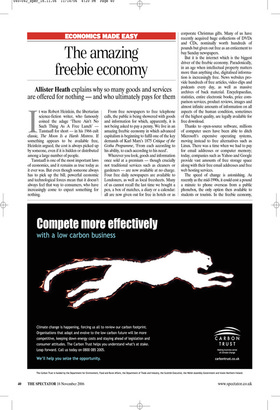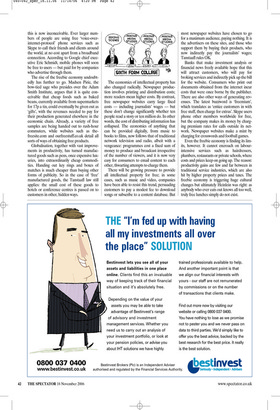The amazing freebie economy
Allister Heath explains why so many goods and services are offered for nothing — and who ultimately pays for them It was Robert Heinlein, the libertarian science-fiction writer, who famously coined the adage ‘There Ain’t No Such Thing As A Free Lunch’ Tanstaafl for short — in his 1966 cult classic, The Moon Is a Harsh Mistress. If something appears to be available free, Heinlein argued, the cost is always picked up by someone, even if it is hidden or distributed among a large number of people.
Tanstaafl is one of the most important laws of economics, and it remains as true today as it ever was. But even though someone always has to pick up the bill, powerful economic and technological forces mean that it doesn’t always feel that way to consumers, who have increasingly come to expect something for nothing. From free newspapers to free telephone calls, the public is being showered with goods and information for which, apparently, it is not being asked to pay a penny. We live in an amazing freebie economy in which advanced capitalism is beginning to fulfil one of the key demands of Karl Marx’s 1875 Critique of the Gotha Programme, ‘From each according to his ability, to each according to his need’.
Wherever you look, goods and information once sold at a premium — though crucially not traditional services such as cleaners or gardeners — are now available at no charge. Four free daily newspapers are available to Londoners, as well as local freesheets. Many of us cannot recall the last time we bought a pen, a box of matches, a diary or a calendar: all are now given out for free in hotels or as corporate Christmas gifts. Many of us have recently acquired huge collections of DVDs and CDs, nominally worth hundreds of pounds but given out free as an enticement to buy Sunday newspapers.
But it is the internet which is the biggest driver of the freebie economy. Paradoxically, in an age when intellectual property matters more than anything else, digitalised information is increasingly free. News websites provide hundreds of free articles, video clips and podcasts every day, as well as massive archives of back material. Encyclopaedias, statistics, entire electronic books, price comparison services, product reviews, images and almost infinite amounts of information on all aspects of the human condition, sometimes of the highest quality, are legally available for free download.
Thanks to open-source software, millions of computer users have been able to ditch Microsoft’s expensive operating systems, moving instead to free alternatives such as Linux. There was a time when we had to pay for email addresses or computer memory; today, companies such as Yahoo and Google provide vast amounts of free storage space along with their free email addresses and free web hosting services.
The speed of change is astonishing. As recently as the mid-1990s, it could cost a pound a minute to phone overseas from a public phonebox, the only option then available to students or tourists. In the freebie economy, this is now inconceivable. Ever larger numbers of people are using free ‘voice-overinternet-protocol’ phone services such as Skype to call their friends and clients around the world, at no cost apart from a broadband connection. According to Google chief executive Eric Schmidt, mobile phones will soon be free to users — but paid for by companies who advertise through them.
The rise of the freebie economy undoubtedly has further to go. Madsen Pirie, the bow-tied sage who presides over the Adam Smith Institute, argues that it is quite conceivable that cheap foods such as baked beans, currently available from supermarkets for 17p a tin, could eventually be given out as ‘gifts’, with the revenues needed to pay for their production generated elsewhere in the economic chain. Already, a variety of free samples are being handed out to rush-hour commuters, while websites such as thefreesite.com and ourfreestuff.co.uk detail all sorts of ways of obtaining free products.
Globalisation, together with vast improvements in productivity, has turned manufactured goods such as pens, once expensive luxuries, into extraordinarily cheap commodities. Handing out key rings and boxes of matches is much cheaper than buying other forms of publicity. So in the case of ‘free’ manufactured goods, the Tanstaafl law still applies: the small cost of these goods to hotels or conference centres is passed on to customers in other, hidden ways. The economics of intellectual property has also changed radically. Newspaper production involves printing and distribution costs; more readers mean higher costs. By contrast, free newspaper websites carry large fixed costs — including journalists’ wages — but these don’t change significantly whether ten people read a story or ten million do. In other words, the cost of distributing information has collapsed. The economics of anything that can be provided digitally, from music to books to films, now follows that of traditional network television and radio, albeit with a vengeance: programmes cost a fixed sum of money to produce and broadcast irrespective of the number of viewers, and it is now very easy for consumers to email content to each other, thwarting attempts to charge them.
There will be growing pressure to provide all intellectual property for free; in some cases, such as music and video, companies have been able to resist this trend, persuading customers to pay a modest fee to download songs or subscribe to a content database. But most newspaper websites have chosen to go for a maximum audience, paying nothing. It is the advertisers on these sites, and those who support them by buying their products, who now indirectly pay the journalists’ wages; Tanstaafl rules OK.
Banks that make investment analysis or financial news freely available hope that this will attract customers, who will pay for broking services and indirectly pick up the bill for the website. Consumers who print out documents obtained from the internet incur costs that were once borne by the publisher. There are also other ways of generating revenues. The latest buzzword is ‘freemium’, which translates as ‘entice customers in with free stuff, then charge for extras’. Skype users phone other members worldwide for free, but the company makes its money by charging premium rates for calls outside its network. Newspaper websites make a mint by charging for crosswords and football games.
Even the freebie economy is finding its limits, however. It cannot encroach on labourintensive services such as hairdressers, plumbers, restaurants or private schools, where costs and prices keep on going up. The reason: productivity gains are few and far between in traditional service industries, which are also hit by higher property prices and taxes. The freebie economy is triggering huge cultural changes but ultimately Heinlein was right: as anybody who ever eats out knows all too well, truly free lunches simply do not exist.



































































































 Previous page
Previous page